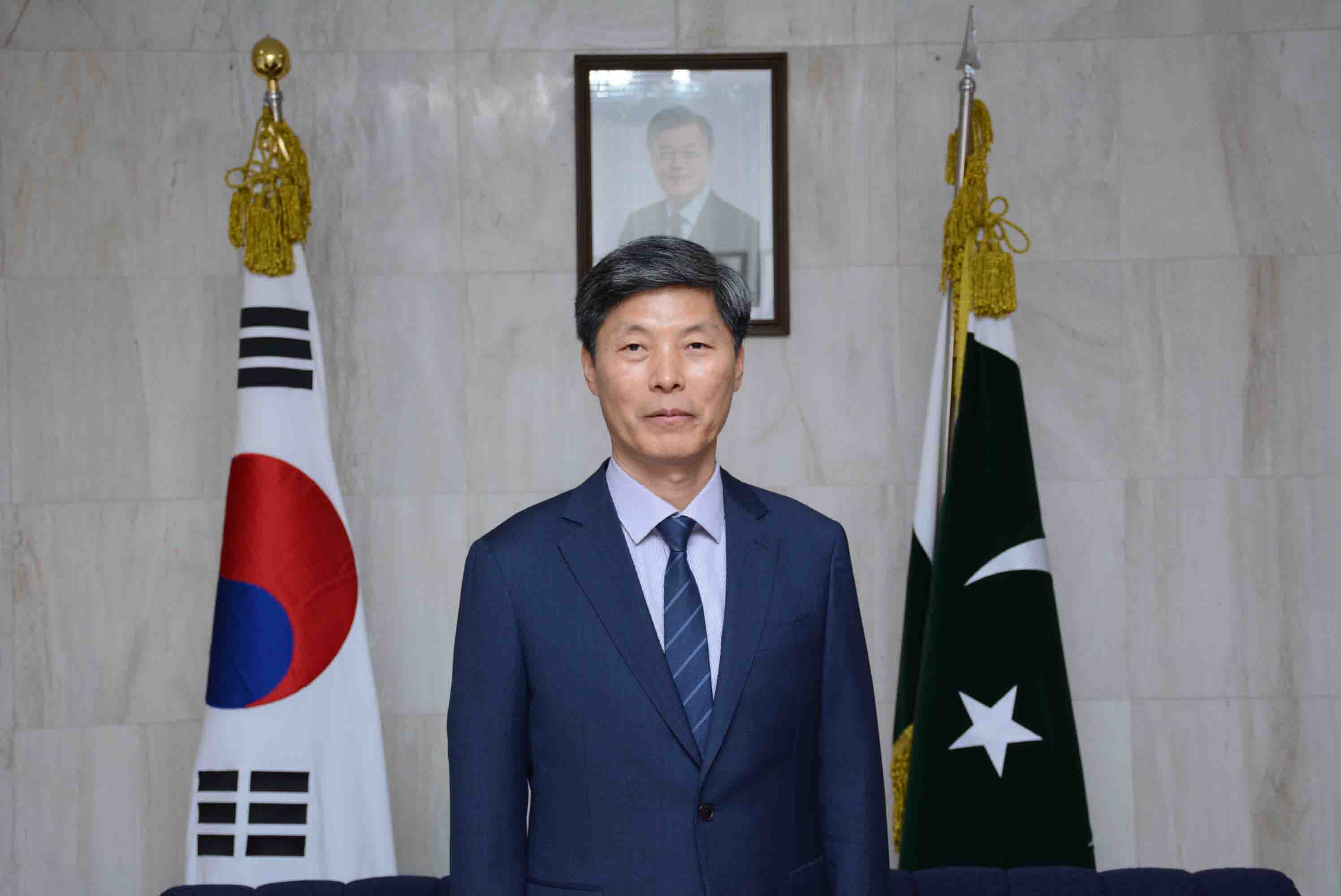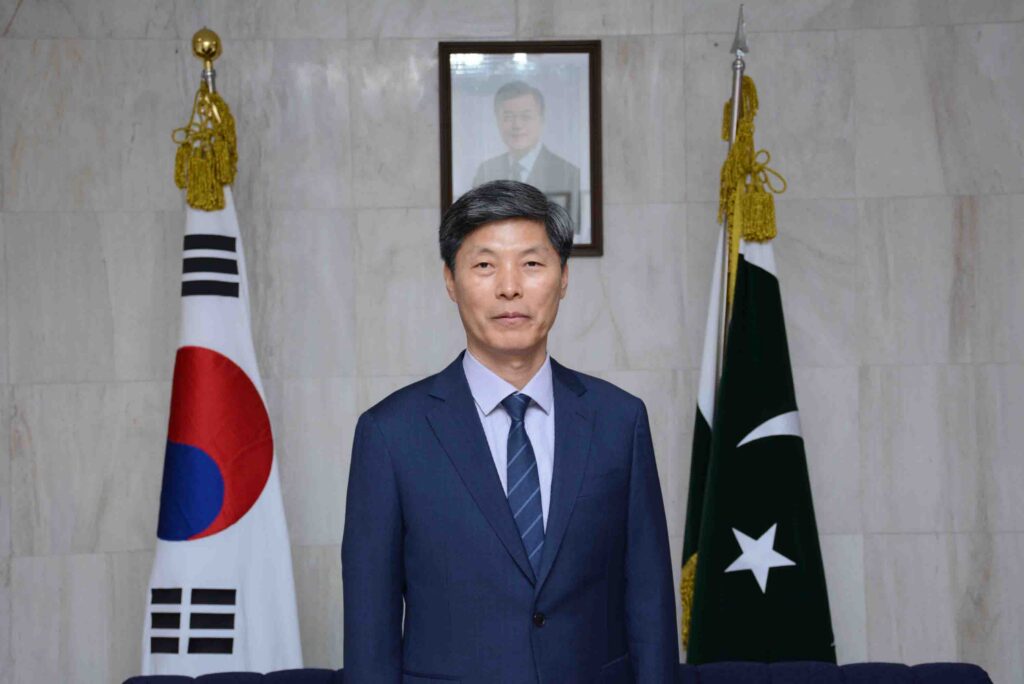
Exclusive interview
Pakistan has an abundance of natural resources and skilled labor forces, while
Korea is rich in capital, advanced technology and development experiences
We can take Advantage of our Synergy & Earn win-win achievements
H.E. Kwak Sung-kyu
Ambassador Republic of Korea to Pakistan
Interview by Mian Fazal Elahi
H.E. Kwak Sung-kyu is the new ambassador Republic of Korea to Pakistan. H.E. presented his credentials to President of Islamic Republic of Pakistan H.E. Mamnoon Hussain on February 01, 2018.
H.E. started his diplomatic career in May, 1991 and then served in China, Australia, Bangladesh, Iran, Netherland and Israel. H.E. Kwak Sung-kyu is a very active and energetic diplomat.
The Diplomatic Focus has found the opportunity to talk to His Excellency and learn about his early life, education career, experiences and most importantly his role as an ambassador in bringing Korea and Pakistan closer in terms of trade, investment, diplomatic, education and cultural ties.
DF: Diplomatic Focus is thankful to you for giving time for interview. Readers would like to know about your profile, your career and your experiences as a diplomat.
Thank you, Mr. Elahi. I am honored to have an interview with the Diplomatic Focus magazine. I am fortunate to have served as a Korean diplomat for the last 27 years. In retrospect, my diplomatic career has been very rewarding as my service in many different areas of the world, such as Beijing, Canberra, Dakar(Bangladesh), the Hague, Tehran and Tel Aviv, allowed me to make myself exposed to a variety of people and cultures. Pakistan is one of the 7 countries to which I have ever been posted and I am looking forward to my tenure here.
DF: Please tell us about the current state and future potential of Korea-Pakistan bilateral relations.
Since Korea’s establishment of diplomatic relations with Pakistan in 1983, there has been many interactions between the leaders of Korea and Pakistan. It includes the visits of the Korean Prime Minister and the National Assembly Speaker to Pakistan in 2014, and the summit meeting on the sidelines of the 70th UNGA Session in New York between the Korean President and the Pakistani Prime Minister in 2015. In 2017 another Korean Speaker visited Pakistan and met His Excellency Shahid Khaqan Abbasi, Prime Minister of Pakistan as well as many other dignitaries. These high-profile visits have given a strong boost to the positive momentum of our bilateral relations.
I believe that Korea and Pakistan have complimentary advantages to offer each other, sharing great potential for cooperation. Pakistan has an abundance of natural resources and skilled labor forces, while Korea is rich in capital, advanced technology and development experiences. In consequence, we can take advantage of our synergy and earn win-win achievements for both countries.
DF: What are the salient features of Korean economic growth?
Korea’s GDP is now over 1.4 trillion dollars, making it the 11th largest economy in the world. Korea presents a compelling story of economic development as it made the transition from a resource-poor, low-income nation to a high-income advanced economy successful in only three decades. This journey of rapid development was due to many factors such as the trade and investment facilitation policy, the export-driven-industrialization strategy, the construction of roads and allied infrastructure, the fruitful implementation of five-year economic development plans, the gradual opening of the economy to global competitors and the strong focus on developing human resources etc.
Successive governments incentivized corporations to develop new technologies and to invest in the heavy industries like steel, chemical and shipping in order to compete in the highly-competitive global market. Additionally, the inflow of foreign capital was greatly encouraged to supplement the shortage of domestic savings.
Korea achieved rapid economic growth of over 8 percent for almost thirty years. Policy makers in developing countries can study the Korean economic development model and learn lessons from this proven legacy.
DF: Would you like to illustrate the nature of Pak-Korea economic relations?
Since the establishment of diplomatic ties between Korea and Pakistan in 1983, our bilateral relations, especially economic cooperation, have gradually expanded in various areas including trade, business, development and financial assistance.
Korea is one of the leading trade partners of Pakistan and trade volume between the two countries was above $1.3 billion in 2017. In order to further increase this trade partnership both countries have started discussions regarding a Free Trade Agreement (FTA).
Koreans are keenly investing in Pakistan in various sectors including energy, petrochemical, automobile, confectionery and electronics. The Korean companies’ presence here in Pakistan is contributing to Pakistan’s economy in terms of FDI, job creation, transfer of technology.
In infrastructure development area, the Korean companies have completed a variety of landmark projects including the Islamabad-Lahore Motorway (M-2), the Lowari tunnel, several hydro and thermal power plants, the Karachi Port expansion and the Hyderabad-Mirpurkhas carriageway.
On the development assistance side, Korea is providing financing and aid-grant for various socio-economic development projects in Pakistan. In the last two years Korea pledged over $216 million under the Economic Development Cooperation Fund (EDCF) for highway, health and IT infrastructure projects. An additional $800 million is in the pipeline for the period of 2018~20. Korea is also extending aid-grant for social welfare projects and capacity building.
Korea looks forward to building upon its existing ties with a vision towards achieving a healthy, stable and mutually beneficial partnership for two countries.
DF: Presently, both countries are looking to expand economic cooperation, as well as to enhance their import and export ties. In your opinion what are the various sectors where Pakistan and Korea can cooperate and collaborate?
Currently, Korean firms in Pakistan are mostly focusing on the areas such as energy, infrastructure development, manufacturing of chemicals, automobiles, home appliances and confectionary. However, potential for economic cooperation is much higher than our current volume.
DF: Level of Korea-Pakistan trade and commerce in increasing. Would you please highlight opportunities that are offered for Pakistani businessmen?
Pakistani businessmen are welcome to business and trade collaboration projects with Korean entrepreneurs. Pakistani businesses may also take advantage of the latest technologies and management techniques perfected by Korean companies. My embassy and the KOTRA office in Karachi are glad to facilitate such business partnerships. The recent joint ventures of Hyundai and KIA Motors with local partners will be great examples of such success stories.
DF: As the new ambassador of Korea to Pakistan, what are your priorities to strengthen the current bilateral relations between the two countries in the new political dynamics and relations of the world?
Korea seeks to improve its relations with all countries of the world. President Moon Jae-In was elected less than a year ago but in a very short span of time his administration has been very active and dynamic on many fronts, including foreign affairs.
As new Korean Ambassador to Pakistan, I aim to further strengthen Korea-Pakistan bilateral relations. Of course, I would like to attach much priority on improving people-to-people exchanges and making economic and trade linkages stronger than before.
DF: Asia Pacific is very important region; these days different issues are posing severe threat to security in the region. Keeping in mind the present scenario, how do you see the future of the region as complex interdependence in prevailing in the region?
I believe the Asia-Pacific region faces many challenges due to its complex historical legacy, but it also has a lot of room for cooperation. Despite their historical disadvantages and disagreements, many countries in the region have a very high volume of trade and strong cultural bondage with each other.
In regards of the situations of the Korean peninsula, I would like to introduce to the Diplomatic readers the recent positive developments. A great milestone was achieved when the Olympic teams of the Republic of Korea (South Korea) and the Democratic People’s Republic of Korea (DPRK/North Korea) marched together under one flag at the opening ceremony of the 2018 Winter Olympics held in Pyeong Chang, South Korea last month. Further, North and South Korea fielded a unified team for the women’s ice hockey event. On this global occasion, North Korea has sent cheerleaders and a musical band to South Korea for the Olympics. On the sideline of the Olympics the North Korean high-level leaders also visited South Korea to have valuable contacts with South Korean leaders, issuing my President an invitation to their capital. It was quite sure that the way South Korea was managing the Olympic Games was ‘very impressive’ to the North Korean visitors. The South Korean government really hopes that this positive momentum of peaceful spirit and détente mood can keep lasting even after the Pyeong Chang Winter Olympic Games. I would like to see this leading up to sincere talks between two Koreas, opening the gate to denuclearization of the Korean peninsula, which is the only way to the lasting peace on the Korean peninsula.
DF: People to people contacts are very important; do you think these relations can be improved further? Is there any cultural and student exchange cooperation between our two countries.
When I met H.E. Mr. Mamnoon Hussain, President of Pakistan on the occasion of presenting my President’s credential to him on February 1st, he emphasized the necessity of the sustainable cooperation between our two countries in the field of education, which I totally agree with. People to people contacts and enhancing awareness among peoples are very important for further development of the bilateral relations. There are already many cultural and student exchange programs between our countries. Nearly a thousand Pakistani students have benefitted from Korean government, KOICA and university scholarships in the past few years. At a more professional level, hundreds of Pakistani government officials have visited Korea for various training programs.
In recent years our cultural exchanges have also increased a lot. Each year various functions are held in Pakistan to increase our cultural links. These include Taekwondo tournaments, Korean film festivals, Hangeul [Korean language] talking competitions, K-pop competitions and performances of Korean musical troupes in Pakistan.
Conversely, a collection of Gandhara artifacts from Pakistan were exhibited in Korea in September 2017, attracting many Koreans to the exhibition. And this year, Pakistani athletes competed in the Winter Olympics in Korea.
DF: As an Ambassador, what is your opinion about the people of Pakistan and how many Pakistani cities have you visited.
Despite such a short period of time, my interactions with Pakistanis have been very pleasant, positive and productive. Last month I visited Lahore, the heart of Punjab. The beautiful and peaceful scenery between Islamabad and Lahore was especially idyllic, enough to make me recollect my childhood. It was a pleasant and sweet trip. I am looking forward to visiting as many cities and villages as possible in the coming months. I am looking forward to meeting many Pakistan people and to fully enjoying the rich culture and stunning natural beauty that Pakistan has to offer.
DF: Any message you want to give to the youth of Pakistan?
I have great expectation for Pakistani youth because I see great potential in them. They are intelligent, active and dynamic. I am sure the young generation will play pivotal roles in the future development of Pakistan. Thank you.
Thanks a lot Your Excellency! For giving time out of your busy schedule and of course for your nice talk.
|
|
|
|
|
|
|
|


